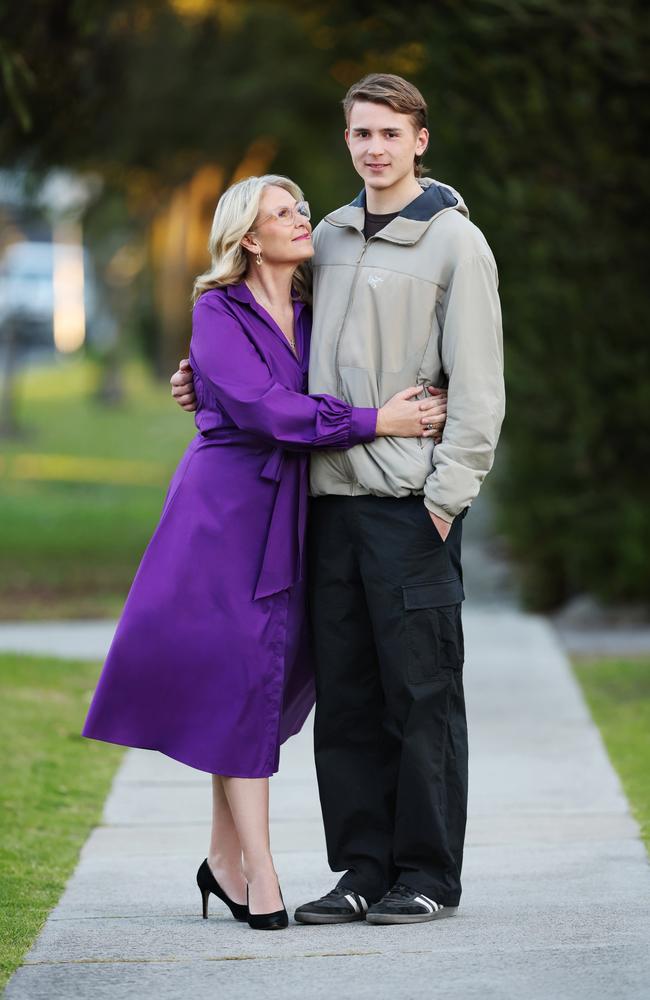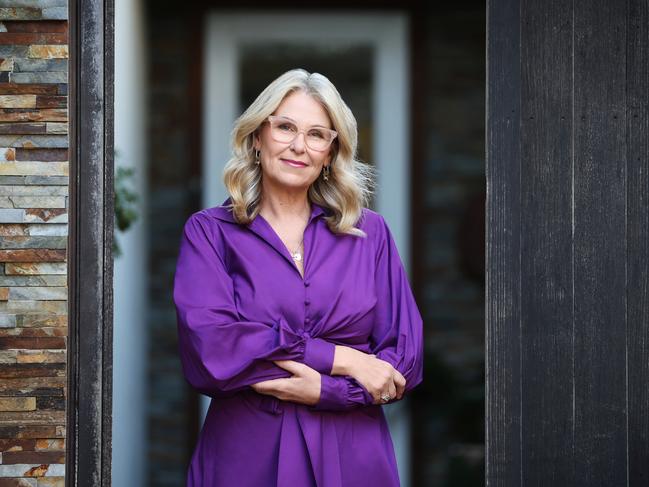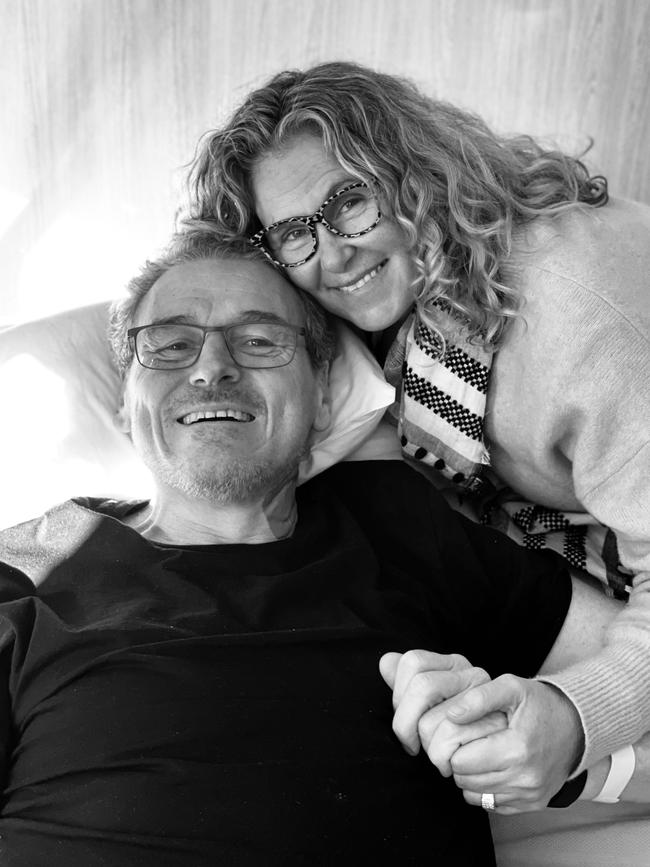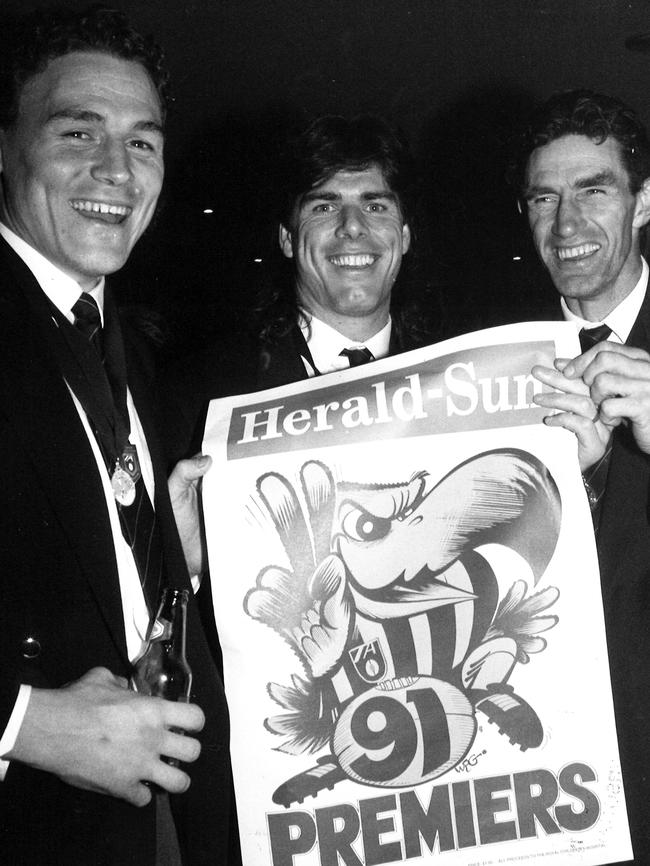Late AFL star’s son: ‘Dad is always on my mind’
Calsher Dear – the son of late AFL champion Paul Dear – and his mother, Cherie, reflect on the loss of the former Hawks great to pancreatic cancer, as they lead a push for more research into the silent killer.
Stellar
Don't miss out on the headlines from Stellar. Followed categories will be added to My News.
Nobody was expecting Calsher Dear to perform miracles in his first AFL game.
It was a magical moment for his family and friends, all of them bursting with pride, and also a special one for the thousands of footy fans gathered at Melbourne’s Marvel Stadium in early May to see the Hawthorn newcomer run out onto the field wearing his AFL champion father Paul Dear’s colours.
But Calsher was brimming with resolve – and soon enough, he flew high into the air, took a jaw-dropping mark and slammed the ball straight through the goalposts, inspiring the Hawks to an eventual upset victory over the Western Bulldogs.
It was a page straight out of his famous father’s playbook, as the 18-year-old acknowledged when he pumped his fist to the heavens in an emotional nod to Paul, who passed away from pancreatic cancer in July 2022, aged 55.


“Dad is always on my mind,” Calsher tells Stellar. “But in moments like that, I really feel his presence. It was extra motivation to do him proud, and it felt euphoric.”
Asked how she felt watching her son’s big moment from the stands, Cherie Dear recalls: “It was surreal. We were cheering and crying at the same time. I was so proud of Calsher’s composure – there was a lot of pressure on his shoulders coming into this game, but his mental toughness was just like his dad’s.
“I was so happy and my emotional release valve just went off. But there was also a deep sadness. Because Paul should have been there, too – to pat Calsher on the back and tell him how proud he was of him.”
Last week, the Dear family – IT business development manager Cherie and children Harry, 27, Nate, 21, Maya, 20, and Calsher – marked the second anniversary of Paul’s death.
And the extraordinary legacy they have created in honour of the Norm Smith Medal winner was clear from a quick scan of the stands on the day Calsher achieved that incredible goal.
Among the sea of brown and gold scarves were splashes of purple and white, the colours of Dare To Hope – the charitable initiative Paul and Cherie established after they learnt he had stage 4 cancer in September 2020.

“When Paul was diagnosed, pancreatic cancer was virtually unknown but it affects so many Australian families,” Cherie tells Stellar.
“Paul wanted action. He wanted to change the situation and do something tangible, to make it easier on the next family going through this. And even though it had been a long time since he played AFL, we knew his profile could help.”
Each year, 4500 Australians are diagnosed with pancreatic cancer, and just 13 per cent of those will survive beyond five years.
Symptoms such as loss of appetite or weight loss can be vague or go unnoticed, especially in the early stages; often by the time of diagnosis, palliative care is the only option, earning the disease the devastating nickname of the “silent killer”.
Determined not to waste a minute of whatever time they had left, the Dears invited a camera crew into their home and filmed a fly-on-the-wall documentary of Paul’s battle, which aired on the Seven Network in 2022.
They then turned their attention to raising funds for critical research through a Dare To Hope AFL game.


All the while, Cherie shared their journey on Instagram. “Social media gets a bad rap, but it was a very positive thing for us,” she reveals. “There’s very little you can control with a diagnosis like Paul’s – we wanted to empower ourselves in a situation where we were otherwise powerless.”
Adding to their urgency, a close friend of Paul’s had died of pancreatic cancer the same week he was diagnosed. “She only survived nine weeks after her diagnosis,” Cherie says.
“That terrified and motivated us. We kicked into gear, determined to embrace true mindfulness, to really live in and enjoy every minute we had.”
After getting their financial affairs in order – even spending a Friday night driving around local cemeteries so that Paul could choose where he wanted to be buried – they complemented his medical treatment by trying to find positivity and healing in every opportunity.

The footballer even travelled to a Western Australian forest to bathe in a thermal spring and meditated on a crystal throne in the Shambhala Gardens near the NSW town of Mullumbimby. “He’d never done anything like that before in his life,” Cherie recalls with a laugh. “But he was willing to give anything a go.”
On another trip, the family visited the Kimberley and focused on making memories.
“The time from Paul’s diagnosis to his death was paradoxically some of the happiest and the saddest of our lives,” Cherie says of the almost two years they had with him.
“Dad’s optimism and his outlook on life made his battle so much easier for us,” adds Calsher. “There were so many things we were able to do because of his diagnosis.”
One key thing has been raising more than $680,000 to support life-changing scientific developments through Dare To Hope.
At this year’s charity AFL match in April, Cherie was able to announce the Paul Dear Postdoctoral Fellowship, awarding $360,000 in funding to Dr Michael Lee at the Peter MacCallum Cancer Centre in Melbourne for his work looking into the genomic profile of pancreatic cancer.
By identifying the key protein that drives the disease, Lee says he is confident that a world-first breakthrough could take a novel RNA treatment to clinical trial.
Cherie has even managed to get Prime Minister Anthony Albanese, a longtime Hawthorn supporter, to don the Dare To Hope scarf in Parliament.
“There are still plenty of days I’d like to hide under the doona,” admits Cherie, whose own father, Don, also died of cancer four months after Paul’s passing.
“But the small moments get me out of bed: a walk along the beach, a sunrise, coffee with a friend. It sounds corny, but through Paul’s illness, we really learnt that this is what life is about. If you can string enough small moments together, you find the real joy.
“Paul had such energy and such a zest for life and for us, it’s really about what we can do with that now – not sitting back feeling sorry for ourselves. I’m happy with what we’ve achieved with Dare To Hope so far, but there’s a lot more to be done.”
For more information on Dare To Hope and pancreatic cancer, visit daretohope.com.au. To read more from Stellar, click here.


